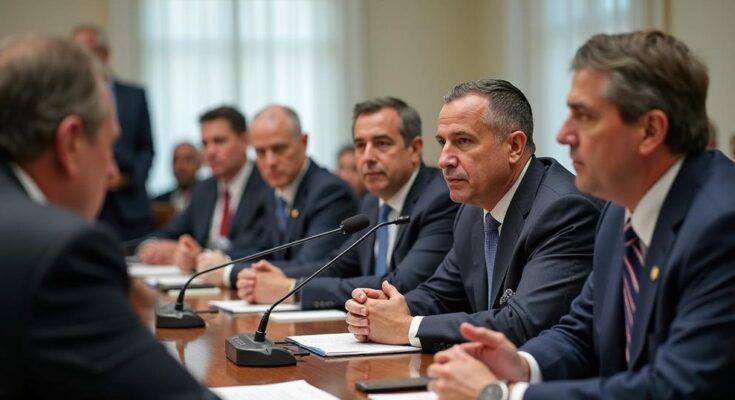The Biden administration has reportedly secured Israeli assurances against targeting Iranian nuclear and oil sites amidst escalated tensions following missile attacks from Iran. Additionally, the deployment of a THAAD defense system aims to bolster Israel’s security. Nevertheless, U.S. officials highlighted that these assurances may not be entirely reliable. Meanwhile, the administration is urging Israel to increase humanitarian aid to Gaza, with potential repercussions on U.S. military funding. The conflict risks spiraling into broader regional hostilities, with ongoing military operations against Iranian proxies in Lebanon and Gaza.
The Biden administration is reportedly confident that it has secured assurances from Israel regarding the non-targeting of Iranian nuclear and oil infrastructure, amidst recent hostilities involving Iranian missile attacks. U.S. officials indicated that the deployment of a Terminal High Altitude Area Defense (THAAD) battery to Israel, along with the assignment of approximately 100 military personnel to operate it, has alleviated some of Israel’s apprehensions regarding potential Iranian counteractions and broader regional security dilemmas. The Pentagon’s decision to equip Israel with THAAD was announced following President Biden’s directive, with the aim of strengthening Israel’s air defenses in light of earlier Iranian missile assaults in October and April. However, U.S. officials emphasized that while Israel has provided promises, these assurances lack guaranteed reliability and are subject to change based on fluctuating domestic Israeli political conditions. A recent incident exemplifies this uncertainty; U.S. officials were informed about Prime Minister Netanyahu’s favorable stance towards a U.S. and French proposed ceasefire in Lebanon, only for Israel to subsequently conduct a significant airstrike killing Hezbollah leader Hassan Nasrallah shortly thereafter. Netanyahu’s office reiterated the country’s stance, asserting, “we listen to the opinions of the United States, but we will make our final decisions based on our national interests.” In correspondence dated Sunday, Defense Secretary Lloyd Austin and Secretary of State Antony Blinken cautioned Israeli leaders that an increase in humanitarian aid to Gaza must be prioritized over the next month; failure to do so may jeopardize Israel’s access to crucial U.S. military funding. The current geopolitical climate is tense, especially after the approximately 180 ballistic missiles Iran launched against Israel on October 1, an act that has raised fears of a potential escalation to a wider regional conflict. Israel’s military offensive against Hamas in Gaza has recently evolved into a ground offensive against Hezbollah in Lebanon, sparking further regional hostilities. President Biden has expressed firm opposition to any Israeli retaliatory strikes against Iranian nuclear sites, emphasizing the importance of exploring alternatives. Such actions could destabilize oil markets and affect gas prices—a critical concern as the U.S. presidential elections approach. In recent communications, Biden and Netanyahu spoke for the first time in weeks, while Secretary Austin has maintained regular dialogues with his Israeli counterpart. The Pentagon reiterated its commitment to Israel’s security while advocating for the safety of U.N. peacekeepers in southern Lebanon, promoting a shift towards diplomatic solutions, and highlighting the urgent humanitarian needs in Gaza. Furthermore, the White House’s National Security Council affirmed, “Our commitment to Israel’s defense is ironclad.”
The geopolitical landscape in the Middle East remains precarious, characterized by ongoing hostilities involving Iran and its proxies, notably Hamas and Hezbollah. The U.S. has historically played a significant role in mediating conflicts and providing military aid to its allies, especially Israel. The deployment of advanced missile defense systems like the THAAD indicates a strategic posture by the U.S. to bolster Israel’s defense against Iranian missile threats. Concurrently, there is a growing emphasis on humanitarian issues, notably in Gaza, as the Biden administration navigates complex diplomatic waters amid rising violence. The actions of local political leaders can severely impact U.S. foreign policy outcomes, especially when trusting assurances from allied governments. The interplay between military readiness and humanitarian considerations will continue to shape U.S. involvement in the region.
In summary, the Biden administration navigates a complex diplomatic situation involving Israel and Iran, with an emphasis on preventing further military escalation while addressing humanitarian needs in Gaza. Although assurances from Israel have been received, their reliability remains questionable amid volatile domestic politics. The U.S. continues to advocate for diplomatic solutions while reinforcing Israeli military capabilities to counter Iranian threats. The evolving dynamics underscore the delicate balance necessary to maintain regional stability and U.S. interests.
Original Source: www.pbs.org




